"Ya hemos pasao": the formation of the dictatorship of Francisco Franco and the reasons for the victory of the Francoists in the Spanish Civil War
Speaking of Francisco Franco, it should be noted that, depending on the political views of historians, he is often written either as a “second-class fascist dictator”, or as a political sharpie who was lucky to survive in the era of colossi. Frankism, on the other hand, is often equated with fascism, and many Russian historians and writers are especially guilty of this. In particular, the author of several books about the events of 1936-1939, S. Rats calls the Spanish Civil War "the first battle with fascism."
In addition, it is widely believed that the national-traditionalists led by F. Franco won the victory in the civil war only thanks to the help of Italy and Germany. Some historians emphasize that the volume of supplies of fascist Italy and Nazi Germany significantly exceeded the aid of the USSR, and that is why the Francoists achieved military superiority.
As the historian Denis Krelenko rightly notes, they largely predetermined the attitude towards Franco and Francoism, both at the level of mass consciousness and at the level of research, defeated during the civil war of 1936–1939. representatives of the "left" and liberals who settled in the USSR and the democratic countries of Europe. Nevertheless, there are enough objective works devoted to Francisco Franco and Francoism, however, they are mostly foreign literature. Of the few major domestic studies, the works of the historian D. M. Krelenko “Francisco Franco: the path to power”, S. P. Pozharskaya “Generalissimo Franco and his time” and the monograph by M. S. Volkov dedicated to the Spanish political elite should be noted.
In this material, we will touch upon the question of the ideological origins of Francoism, and also try to refute some myths about the Spanish Civil War and understand why it was the Francoists who won the war of 1936-1939.
The ideological origins of Francoism
The ideology of Francoism was formed on the basis of a unique synthesis of various right-wing ideologies. Francoism is sometimes mistakenly identified with Falangism. However, phalangism was only one of the components of the ideology of Francoism, along with others that were by no means less important.
The emergence of a synthesis of various right-wing ideologies, which led to the formation of the ideology of Francoism, was due to the historical conditions in which Spain found itself in 1936. A broad coalition of right-wing forces came out against the government of the Republic of the Popular Front, of which only the Phalanx, and even then with certain reservations, can be considered as a fascist movement. The remaining members of this coalition – Carlist monarchists (“traditionalists” is another name for Carlists), Alfonsist monarchists, supporters of the CEDA party close to the Christian-Democratic direction, members of various Catholic organizations – were not fascists in any way [2].
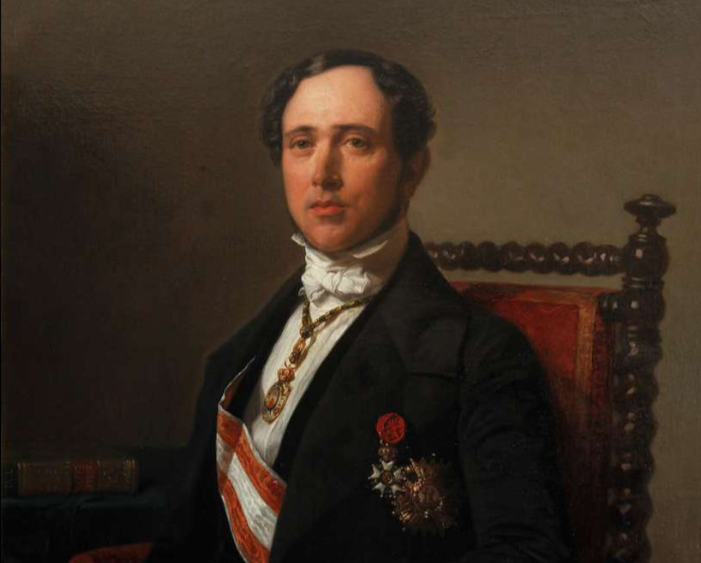
As noted by some researchers, in particular Roman Kabeshev, one of the key components of the doctrine of Francoism was the doctrine of "Hispanidad", which is based on the principles of the Catholic social concept. The conservative Juan Donoso Cortes stood at the origins of this doctrine, who subjected the modern order to the deepest analysis and criticism from the standpoint of Catholicism and traditional culture. It was he who pushed the Spanish political thought in this direction, remaining far from the idea of the Spanish nation [4].
A more serious contribution to the development of the idea of "Hispanidad" was made by B. Gomez Montsegu, who published a book called "The West and Hispanidad" during the years of the highest integrism of the Francoist ideology, where he outlined his theory of Catholic Hispanism. The main thing for Montsegu is the idea of a special mission for Spain in world history, which is associated with Catholicism. With the creation of the Hispanidad doctrine, Spanish Catholics embarked on the path of evolution from a world religion to a national one [4].
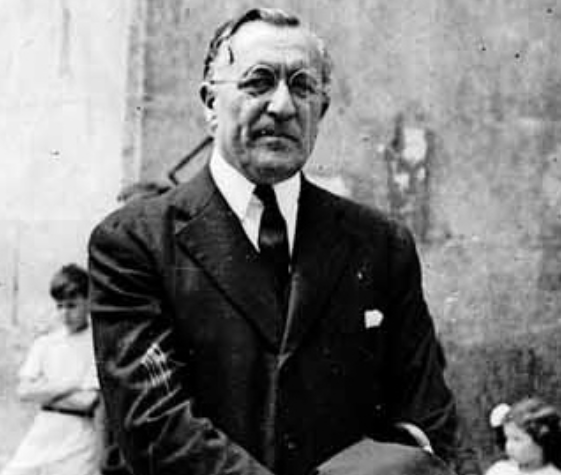
However, the true creator of the Hispanidad doctrine was Ramiro de Maestu. Maestu wrote about a new type of society, which he defined as "democratic, corporatist-syndicalist and functional", and contrasted it with both bourgeois and socialist. The primary basis of the social structure should be objective morality, that is, a system of norms, laws and customs, inextricably linked with evaluation criteria arising from "enduring values" - the concepts of absolute goodness, justice, duty, dignity, spiritual unity and equality [4].
If we talk about the "Spanish phalanx" and JONS (Junta of the advance of national syndicalism, united in 1934), founded by José Antonio Primo de Rivera, then it cannot be said that it did not correspond to the Spanish tradition at all. The Phalanx program and the Hispanidad doctrine were united by a common "cult of Spain", with the Maestu doctrine echoed the mention of the special position of Spain as the "spiritual axis of the Spanish world."
However, there were also significant differences between them. Maestu has repeatedly spoken out in favor of a Catholic, hereditary monarchy, neither liberal nor fascist, while questions about faith and the church have taken a secondary place in the Phalanx program. The Falangists were also cold towards monarchism (the ideology of Falangism and the views of J. A. Primo de Rivera may be considered in other materials).
Francisco Franco was forced to reckon with the fact that the Falange supported movements related to Falangism in Italy and Germany, as well as with the influence of this movement within the country, but he was a person who shared traditional values, a Catholic believer, an officer imbued with the ideology of his environment. Therefore, his authoritarian power was, first of all, the power of this already quite traditionalist environment in itself and was not a totalitarian dictatorship that attempted to subjugate the corresponding ideology of all aspects of life. The Falangists were one of the components of the Franco regime, while all other components of this system - the army, the church, the monarchists, the conservatives - were elements of traditional Spanish society [3].
An authoritative researcher of fascism, the Italian historian Emilio Gentile does not consider the dictatorship of Francisco Franco in Spain and António di Salazar in Portugal to be fascist.
The Franco regime was not a totalitarian dictatorship, but an authoritarian dictatorship, at no stage of its development was it totalitarian. Francoism can be seen as a manifestation of the tradition of Iberian political culture. Therefore, to equate it with fascism means going against historical reality.
Francisco Franco was a staunch conservative who equally rejected the ideas of the revolution from both the left and the right, and it is thanks to this, as historian Denis Krelenko notes, that the defeat of the admirers of leftist utopias did not turn into a triumph of right-wing extremism in Spain.
Causes of the uprising of the "right" forces in Spain
Francisco Franco's regime was forged in a bitter civil war between 1936 and 1939, with brutality on both sides. It is no coincidence that the English writer J. Orwell, having left to fight on the side of the Republicans, returned as a staunch opponent of totalitarianism [7].
The nationalist uprising of July 18 was not so much the initiative of Generals F. Franco, E. Mola and J. Sanjurjo, but rather the result of a divided and increasingly polarized political culture in Spanish society. The extreme manifestations of this split were the Spanish Falange on the right and the anarchists on the left. The model of governance that existed in Spain could not resolve the contradictions, and under these conditions, the elections of 1936 only consolidated the existing deep split in society, bringing to power the left-wing Republicans, who encouraged anti-clericalism and unpunished attacks on representatives of the right-wing forces [7].
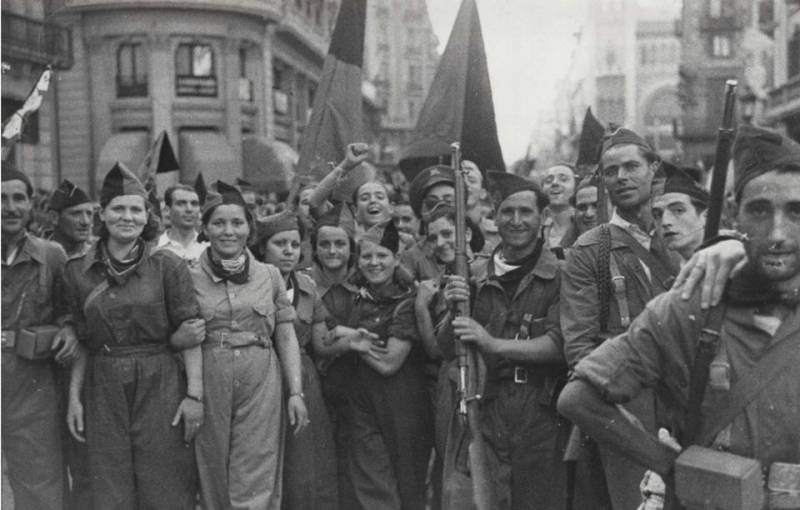
As historian Denis Krelenko notes, the anarchists took the victory of the Popular Front as carte blanche for their measures to destroy the old and build a new society. Across the country, reprisals began against those who voted for the right, were among their adherents or were considered as "exploiters". One of such episodes of the massacre of lumpen led by extremists is perfectly described in E. Hemingway's novel "For Whom the Bell Tolls?". Once again, as at the time of the overthrow of the monarchy, churches and monasteries were on fire, gangs of pistoleros (assassins) organized street skirmishes [1].
On March 17, 1936, the government of M. Azaña outlawed "the most violent group of Spanish fascism - the Falange." The government dubbed fascists all those who tried to protest against extremist atrocities and the government's powerlessness in the fight against them. The fascists included peasants who were outraged by the burning of churches, the bourgeoisie, who did not want to give up their property, the military, who were dissatisfied with the abundance of armed "vigilantes" from the PSOE, the KPI and anarcho-siqdicalist groups [1].
In contrast to the unification of the forces of the Popular Front, the consolidation of national-traditionalists accelerated. Falangists and "green shirts" from the youth groups of "Catholic Action" were not inferior in cruelty to left-wing extremists [1].
The Republican government stubbornly tried to avoid conflict with the anarchists and turned a blind eye to their outrages. However, for many Spaniards (and Spain was a deeply Catholic country), the struggle of the anarchists with the church meant a struggle with those aspects of life that were for the ordinary Spaniard a familiar and dear part of his spiritual being. The image of a destitute, persecuted priest became the first banner under which traditionalists united [1].
In such a situation, the transition from parliamentary methods of struggle to violent ones was inevitable and natural. The conspiracy against the government of the left was brewing in the military environment, which was traditionally the most active part of Spanish society. The conditions for this were quite suitable. The second republic was unconditionally supported only by the Catalan autonomy and the Madrid proletariat. The rest of the regions and strata of Spanish society were far from unanimous in regard to the republic [1].
Many peasants were tired of waiting for the promised land and were outraged by the desecration of the church. Most of the bourgeoisie were worried about attacks on property and wanted to stop the anarchist revelry. The monarchists, whose main support was the old landed aristocracy, to whom the government stopped paying compensation for the confiscated lands, clearly had a negative attitude towards the republic. The results of the February vote showed that a third of the Spaniards retained sympathy for the national traditionalists, and the other third, who did not participate in the elections, became imbued with similar sympathies during the next round of reforms [1].
It was on these heterogeneous forces that right-wing organizations from the Phalanx to the monarchists of Requete relied. The army was to become the main striking force in the struggle of traditional Spain for the right to exist. She was provided with the blessing of the church and the sympathy of that part of the population that did not want great upheavals, but “great Spain”, living in conditions of law and order [1].
Myths about the superiority of the Francoists over the Republicans in the number of weapons
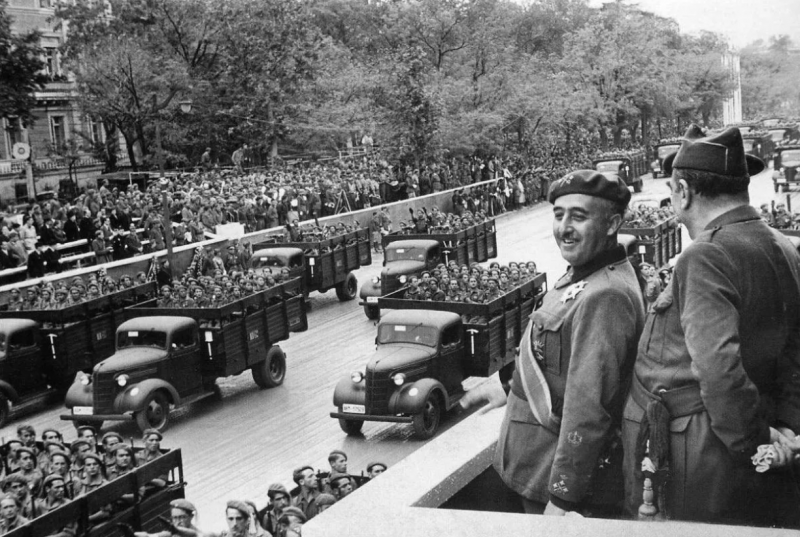
In historiography, mainly at the suggestion of researchers inspired by the memories of Republican emigrants, there is a fairly common opinion about the overwhelming superiority of the Francoists in weapons, which allegedly arose due to the huge volumes of Italian-German deliveries.
In particular, historian Gerald Brenan writes the following:
This was also mentioned by some military men who fought on the side of the republic. For example, Enrique Lister recorded:
However, was it really so?
According to the Soviet side, the USSR supplied the Spanish Republic with 806 aircraft, 362 tank, 120 armored vehicles, 1 guns, 555 machine guns, 15 rifles [113]. Let's compare these figures with what the nationalists received from Germany and Italy: combat aircraft - 500 and 10, respectively, tanks - 600 and 660, artillery - about 200 and 150 barrels from each of the suppliers. At first glance, these figures confirm the above statements regarding the superiority of the rebels in aircraft and artillery [1].
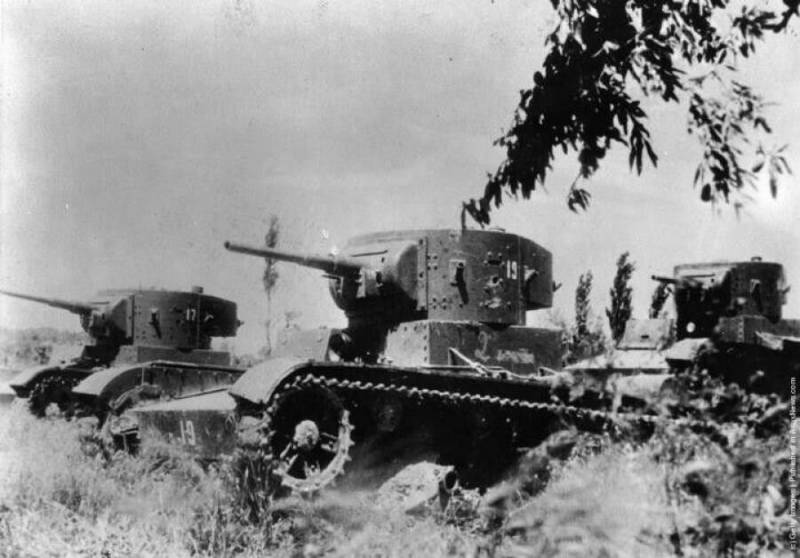
However, the USSR was not the only one who supplied aircraft for the republic, and therefore we will add another 320 aircraft received from other countries to the republican air force. Thus, 1 vehicles received by the nationalists are opposed by 200 acquired by the Republicans; in this case, it is no longer necessary to talk about some kind of total superiority.
There are researchers who believe that the Soviet data is not entirely accurate. Hugo Thomas, whose calculations in the West are recognized as the most reliable, gives data on Soviet deliveries in the following figures: aircraft - 1 pieces, tanks - 000 plus another 900 BA. In total, according to his information, 300 nationalist planes and 1 republican planes fought in the sky over Spain [300].
You can not believe these figures, but the republic controlled the main industrial centers of the country and possessed more human resources than the nationalists. The presence of industry made it possible to establish military production, which was done. With the assistance of Soviet engineers, several enterprises for the production of military equipment were re-equipped or rebuilt. Republican Commander aviation I. Cisneros testified:
In Spain, the production of armored vehicles was also established, in particular, armored vehicles based on the ZIS-5-UNL-35 truck or Bilbao armored vehicles, which became the basis of the Republican armored fleet. Other types of equipment were also produced directly in Spain. Therefore, the relatively small figures for Soviet deliveries should not be misleading. At the same time, the Francoists, deprived of an industrial base, were able to establish their own military production only at the end of 1937, after they captured the coast of the Bay of Biscay, where some enterprises suitable for this purpose were located [1].
In the memoirs of Republican tankmen, one common thought sounds: the war in Spain was a triumph of Soviet technology, which was nullified by the tactical illiteracy of the command. The superiority of Soviet technology aroused the envy of the nationalists. For the capture of a republican tank or a database, the command gave large cash bonuses to the lucky ones, which stimulated their soldiers to have a special attitude towards trophies [1].
Thus, the assertion of the overwhelming technical superiority of the heavily armed Francoists over the almost unarmed Republicans has no basis.
But due to what then did Francisco Franco manage to win the civil war?
Reasons for the triumph of Francisco Franco
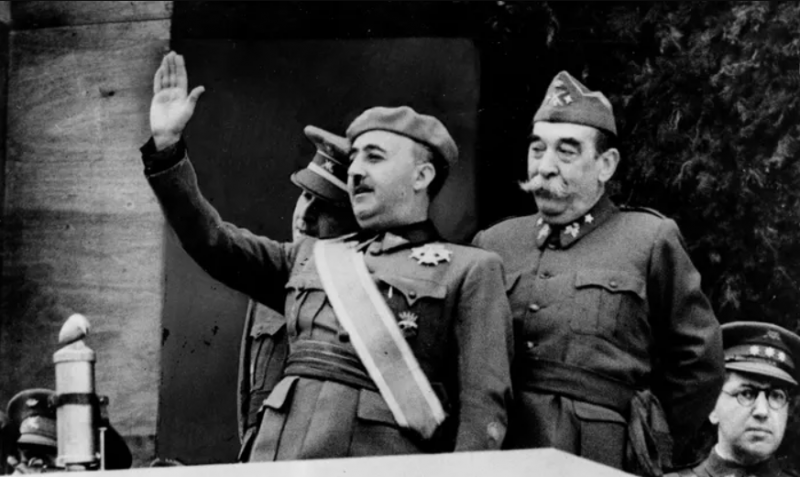
Francisco Franco won the battle for Spain for a variety of reasons.
Firstly, the caudillo managed to make the national camp a single monolith, where all party programs and aspirations were subordinated to a single task - military victory. Franco offered the Spaniards true, understandable slogans, the main meaning of which was to appeal to traditional values: homeland, national unity, a strong state, family, religion. Moreover, he called for the protection of what is called a way of life, a category that is not always amenable to political interpretation, while the slogans of a democratic republic were reduced to abstract ideals - freedom, equality, fraternity, interpreted by each political movement in its own way. Different interpretations of these concepts expressed deep contradictions within the Popular Front [1].
In fact, the republic waged war on two fronts: one divided the supporters of the democratic republic and the nationalists, and the other took place inside the republican camp, supporters of the left republicans and socialists were at enmity with both the anarcho-syndicalists and the communists. Of all the currents and parties, perhaps only the Spanish Communist Party was able to effectively resist the nationalist movement [1].
The second reason for Franco's victory was his purely military superiority. As D. Krelenko notes, it was not a matter of the quantity and quality of equipment - in this respect, the forces of the opponents were quite commensurate, and the issue of superiority in one direction or another was debatable. We are talking about military superiority in the broad sense of the word: in Spain, two types of army clashed: national and professional on the one hand, and popular revolutionary on the other [1].
The Francoist camp had at its disposal most of the Spanish officer corps and actively relied on it. Francoist slogans were aimed at the traditionalist-minded part of the population, at the average layman who wanted to be a Spaniard, a Catholic, a good family man and owner, whose property would not be damaged by various experiments. Such people formed the mass support of the nationalist army. This army was devoid of revolutionary impulse, but it was distinguished by discipline and stamina. It turned out to be prepared to use the latest techniques introduced by German military advisers [1].
At the same time, the Republicans often simply could not put into practice the recommendations of Soviet specialists. The efforts of Soviet advisers encountered either fundamental resistance to their recommendations, or the impossibility of their implementation due to the low professional readiness of the republican army [1].
For example, aviation, most of which remained in the republican zone, was either not used at all for the first time after the start of the war, or was used in such a way that it would be better to do without it. An example of this is the lack of attempts to interfere with the work of the "air bridge" of the nationalists and the bombing of Granada in July-August 1936, which led to civilian casualties and the partial destruction of the most valuable cultural and historical monument of the Alambre fortress, which had no military significance. At the same time, the military airfield located near the city and the ammunition factory on the outskirts of El Fargue were not affected by aviation.
Weapons the Republic had enough. She lacked something else - clear slogans, political unanimity, the will to win, elementary trust in the opinion of specialists who know what is necessary for the successful conduct of the war.
On the other side of the front, things were different.
It was the presence of a well-organized and well-managed, professional in terms of preparedness and national in spirit army that allowed the Francoists to win the civil war [1].
Conclusion
According to some researchers, such as T. A. Alekseeva, Franco's dictatorship was in some way unique in the history of Europe from a political and legal point of view. The dictator quickly reacted to changes in the foreign policy situation and the correlation of socio-political groups within the country, skillfully took into account the economic and social situation, changed allies, and carried out reforms. It is not surprising that Franco's dictatorship did not become a stagnant phenomenon, but was in constant change, including in terms of its state-organizing aspect [10].
The characteristic features of the Franco regime were: anti-communism, the great role of the Catholic Church and Catholic moral principles and norms in public and cultural life, monarchism (manifested not only in the formal restoration of the monarchy, under which Franco actually became regent, but also in the ceremonial design of the regime; the latter was much more magnificent and in line with the traditional ceremonial of the Spanish royal court than the current monarchy of Juan Carlos), corporatism, authoritarian power, rejection of liberal democracy, a combination of traditional conservative values with right-wing methods and rhetoric, adherence to the concept of Hispanidad R. de Maest, an indication of the presence of the supernatural, spiritual dimension of human existence [2].
The entire existence of the Francoist regime can be conditionally divided into four unequal periods. The first period - from 1938 to 1945 was the time of the formation of the regime in the conditions of the civil and then the Second World War, when Spain was subjected to pressure from Germany and Italy. Although the leaders of the Axis countries failed to draw Franco into large-scale hostilities, these circumstances forced him to behave in a certain way [3].
You should not think that Franco had sympathies for Great Britain or France. Undoubtedly, the victory of the Axis countries promised better prospects for his regime. However, in his policy, he adhered to one principle - Spain is above all. He was not going to risk the country and the stability of his own power. Franco understood that in the eyes of the nation, entry into the war could only be justified by a quick, decisive and profitable victory that could bring immediate and tangible benefits to the country [1].
Despite the fact that the policy of the caudillo was transformed depending on the foreign policy situation, Franco remained faithful to the ideological principles of Francoism (mentioned above) and the policy of "balance" almost until his death. This can be seen in the composition of the governments of the Francoist period, which are often referred to in historiography as "balance cabinets", since they always consisted of representatives of various right-wing forces in Spain who opposed the republic in 1936, and then entered the "Spanish Traditionalist Falange", renamed in the late 1940s to the "National Movement". The consensus among the various right-wing forces in Spain lasted until the death of Franco.
F. Franco, who found himself at the head of the "sick" Spanish society, tried to subordinate his likes and dislikes to the solution of one problem - to extract the maximum benefit for his country from the real state of affairs. And we must give him his due - he managed to consolidate his power within the country, avoid Spain's participation in the war, ensure her right to exist in the post-war world, and even lay the foundations for future statehood [1].
Note. “Ya hemos pasao” (“We have already passed”) is a song performed by the singer Celia Gamez, released in 1939, popular among supporters of F. Franco. It was a response to the Republican slogan No pasarán! (They won't pass).
Использованная литература:
[1]. Krelenko D. M. Francisco Franco: the path to power. - Saratov: Sarat Publishing House. un-ta, 2002.
[2]. Protasenko S. V. The ideology of Francoism - under Franco and after. // Politex, 2005, No. 4.
[3]. Volkov M. S. The ruling elite of Spain in the second half of the XX century. - M. Russian Foundation for the Promotion of Education and Science, 2019.
[4]. Kabeshev R. V. Movements of the "third way" in the Western European political process of the XX century: basic concepts, traditionalist ideologies and innovative technologies: dissertation for the degree of Doctor of Political Sciences: 23.00.02. Nizhny Novgorod, 2005.
[5]. Quote from: About Antoine. Twelve lessons in history. M.: Russian. state humanit. un-t, 2000.
[6]. Emilio Gentile. Fascism: history and interpretation. - St. Petersburg: Vladimir Dal, 2022.
[7]. Petrov M. A. Francisco Franco: Reluctant Reformer [Electronic resource] // URL: https://discourse.etu.ru/assets/files/petrov-mapdf.
[8]. Brenan G. The Spanish labyrinth. An account of the social and political background of the civil war. Cambridge, etc., 1990.
[9]. Lister E. Our war. - M .: Publishing house of political literature, 1969.
[10]. Soria Georges. War and Revolution in Spain 1936–1939 In 2 volumes. – M.: Progress, 1987.
[eleven]. Under the banner of the Spanish Republic. Publishing house "Nauka", 11.
[12]. Alekseeva T. A. Franco's dictatorship: formation and originality of subsequent evolution // State and Law. – M.: Nauka, 2008, No. 11. – S. 87–97.
Information